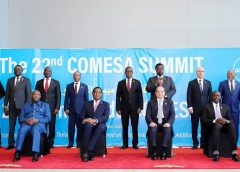The recently approved final communiqué of the 22nd Summit of the COMESA Authority of Heads of State and Government gives an overview of the progress achieved by COMESA under the market integration and infrastructure development pillars, based on the findings of a report that was presented during the Summit by the COMESA Secretary General. Among the conclusions adopted, one deserves particular attention. This is the recommendation to scale up the Tripartite Transport and Transit Facilitation Programme (TTTFP) at Continental level. An harmonized regulation on transport in Africa is key for supporting the African Continental Free Trade (AfCFTA) implementation, because in order to facilitate intra-African trade, it is not only necessary to build roads, but also to ensure that traffic along these roads flows without obstacles that may be created by regulatory gaps and discrepancies.
The TTTFP is an EU-funded programme launched in October 2017 which aims at facilitating the creation of a more competitive, integrated and liberalized regional road transport market in the Tripartite region. It aims at addressing the high transport costs and delays in this region through the adoption of harmonised road transport policies, laws, regulations, systems and standards applicable to drivers, cargo, vehicles and road infrastructure. Within this programme, two main multilateral agreements have been developed:
1) the TTTFP Vehicle Load Management Agreement (VLMA), a harmonized framework for axle load and vehicle dimensions limits in the region, which includes common rules on violations and sanctions applicable to non-compliant transport operators; and
2) the Multilateral Cross-Border Road Transport Agreement (MCBRTA), which aims at harmonizing the transport regulations governing transport of cargo in countries member of the EAC, COMESA and SADC regions.
These two Agreements will need to be ratified by at least 14 Tripartite countries in order to enter into force. They will be complemented by five additional model laws that will serve as a legal basis for guiding Tripartite States in developing uniform national legislations so to avoid the adoption of disjointed and fragmented regulatory frameworks in the area of transport at national level.
The TTTFP also includes the development of an IT system for the registration of cross-border transport operators using the Tripartite corridors (called “TRIPS”), on the basis of their capability to meet specific standards and quality regulation criteria detailed in the MCBRTA. Moreover, it introduced the Corridor Trip Monitoring System (CTMS), a project for the electronic monitoring and surveillance of cargo and truckers’ movements to facilitate safe cross border movement of goods and persons along the main corridors in the region which is basically inspired to the Regional Electronic Cargo Tracking System (RECTS) that is currently implemented along the Northern Corridor.
The proposal to scale up the TTTFP at Continental level is certainly a good idea, but realistically speaking, it is unlikely that other RECs in Africa will accept to adopt the harmonized regulation developed by the Tripartite, because requirements, conditions and problems affecting cross-border transport operations in their territory are very different from those existing in the EAC, COMESA and SADC. So instead of extending the TTTFP to other Regional Economic Communities (RECs), why not to replicate this programme in other multi-REC contexts?
In August 2022, the African Development Bank (AfDB) published the Final Report of a study called “SMART (Sustainable Market Access for African Road Transport)” which analysed the best practices in Africa on solutions to solve the main regulatory and non-physical barriers impeding a streamlined movement of vehicles and goods within and between the different RECs in Africa. The report recommends the other RECs in Africa to adopt Inter-REC Agreements on transport similar to what it has been done by the Tripartite, in particular with regard to harmonization of axle load and vehicle dimensions limits as well as conditions for provision of cross-border logistics services by transporters from one REC to another. Such Agreements should eliminate bilateral transport permits, transport quotas and other uncompetitive non-market freight allocation systems (as the ‘tour de role’ system existing in some Western and Central African States) that contribute to make transport costs high in Africa and should be as much as possible aligned with each other so to facilitate, in future, the merging of such Agreements into a single, harmonized continental Agreement on Cross-Border Road Transport to be adopted under the aegis of the African Union.
source : Desiderio Consultants Ltd






